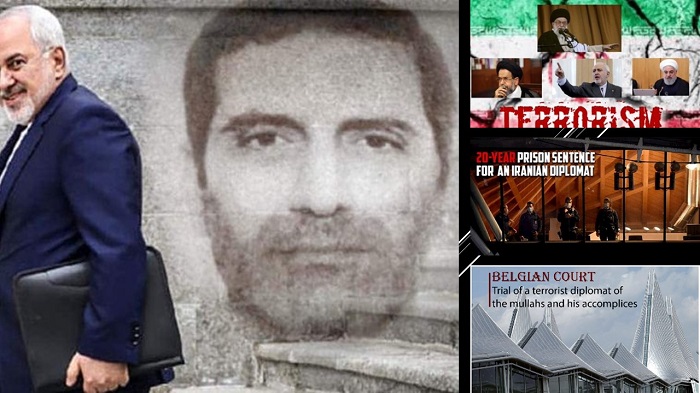
“From the beginning through diplomatic and intelligence channels and dialogue with intelligence services we tried to find a way to protect his rights as a diplomat and secure his return to Iran and these efforts are still continuing,” Zarif said.
Iranian regime Foreign Minister Javad Zarif responded this week to the conviction on terrorism charges of Iranian regime diplomat Assadollah Assadi. Assadi was found guilty by a Belgian court last week of masterminding a plot to bomb the 2018 National Council of Resistance of Iran (NCRI) gathering in Villepinte, France along with three co-conspirators. Assadi was sentenced to 20 years in prison for his role in the foiled bombing plot, while his co-conspirators received 15-18 years each.
Protests to the German, Belgian, and Austrian governments
On February 8, Zarif told State TV that the regime had filed numerous protests to the German, Belgian, and Austrian governments to prevent Assadi from facing trial on the basis of diplomatic immunity, but these efforts had failed.
“From the beginning through diplomatic and intelligence channels and dialogue with intelligence services we tried to find a way to protect his rights as a diplomat and secure his return to Iran and these efforts are still continuing,” Zarif said.
Assadi was denied diplomatic immunity by a Belgian judge because the plot and his arrest occurred outside of his country of service. Assadi was also involved in a major terrorist plot, which would have caused the revocation of his diplomatic immunity even if he had been in his country of service.
A Written Protest
On February 9, the Iranian regime’s Foreign Ministry posted a statement on its website detailing the written protest delivered to the Belgian ambassador to Tehran. The statement read: “Iran’s Foreign Ministry summoned the Belgian ambassador to Tehran to express the Islamic Republic’s strong protest of an illegal verdict issued by the Antwerp Law Court against Iranian diplomat Assadollah Assadi. The top Belgian diplomat was summoned by the director-general for Western Europe affairs at the Iranian Ministry of Foreign Affairs and received a strong written note of protest by Tehran over the court ruling. In the Tuesday meeting, the Iranian official underlined that the Belgian court ruling was in breach of international law and amounted to a violation of Belgium’s commitments with regards to Iran. Therefore, he added, Iran does not recognize the court verdict, whatsoever.”
According to the Belgian media, the Iranian regime is attempting to pressure the Belgian ambassador in Tehran to reverse the ruling. This tactic is unlikely to work, as Belgium’s judiciary is independent of its executive branch.
Belgian media also reported that Assadi was an agent of the regime’s Ministry of Intelligence and Security (MOIS) with close ties to regime officials at the highest levels. Prosecutors at his trial presented evidence found in his truck at the time of his arrest that tied him directly to the terrorist plot. Law enforcement recovered notebooks containing bomb-making instructions, receipts to agents Assadi paid in Europe, addresses and dates of places Assadi had visited, and instructions for his co-conspirators to use after the bombing.
Prosecutors argued that Assadi received his instructions from Zarif and other high-ranking regime officials. His mission was to assassinate NCRI President-elect Maryam Rajavi and demoralize her MEK followers.
‘False Flag’ and Threats
Zarif has attempted to distance the regime from the foiled terrorist attack from the beginning. On July 2, 2018, he claimed the plot was a “false flag operation” and said the MEK was responsible for the bombing attempt, that if successful, would have detonated in a conference hall filled with tens of thousands of MEK supporters and its entire leadership.
When that tactic failed, the regime tried unsuccessfully to prevent Assadi from standing trial, claiming that he should be immune from prosecution. Then in February 2020, Assadi warned Belgium that “his case was being closely watched by undisclosed groups in Iran and neighboring countries” and warned them about the consequences of “an unfavorable verdict,” according to a Reuters report. No such consequences have occurred as of yet.
Uncharted Territory
Now that Assadi has been found guilty, the regime is in uncharted territory. The world has appeased the mullahs for four decades, and it is rare for threats not to work. Basij News worried on February 9 that other regime diplomats might actually face consequences for their actions.
Assadi’s conviction offers an interesting test of what happens when a country doesn’t appease the Iranian regime. Belgium held a terrorist accountable. What if the rest of the world did that?
and People’s Mojahedin Organization of Iran – MEK IRAN – YouTube
